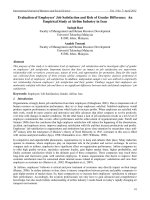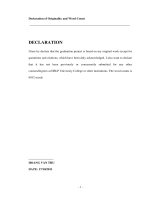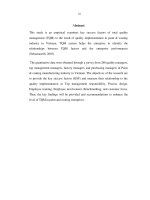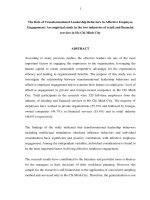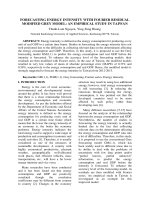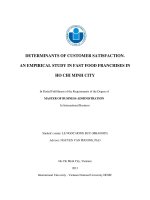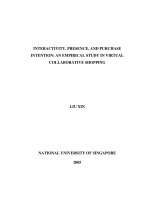Sellected antecedents of consumers ethics an empirical study in vietnam
Bạn đang xem bản rút gọn của tài liệu. Xem và tải ngay bản đầy đủ của tài liệu tại đây (563.57 KB, 78 trang )
UNIVERSITY OF ECONOMICS HO CHI MINH CITY
International School of Business
------------------------------
Luu Chi Nhan
SELLECTED ANTECEDENTS OF
CONSUMERS’ ETHICS: AN
EMPIRICAL STUDY IN VIETNAM
MASTER OF BUSINESS (Honours)
Ho Chi Minh City - Year 2015
UNIVERSITY OF ECONOMICS HO CHI MINH CITY
International School of Business
------------------------------
Luu Chi Nhan
SELLECTED ANTECEDENTS OF
CONSUMERS’ ETHICS: AN
EMPIRICAL STUDY IN VIETNAM
ID: 22120060
MASTER OF BUSINESS (Honours)
SUPERVISOR: DR. LE NHAT HANH
Ho Chi Minh City – Year 2015
Runnung head: SELLECTED ANTECEDENTS OF CONSUMERS’ ETHICS
UNIVERSITY OF ECONOMICS HO CHI MINH CITY
International School of Business
Luu Chi Nhan
Mbus 3.2
Sellected Antecedents of Consumers’ Ethics: An Empirical Study in Vietnam
Supervisor: Dr. Le Nhat Hanh.
Ho Chi Minh City- Year 2015
i
SELLECTED ANTECEDENTS OF CONSUMERS’ ETHICS
ii
ACKNOWLEDGEMENTS
This thesis could not have been completed without the timely and proper advice and
support from a number of people around me. First and foremost I would like to thank my
supervisors Dr. Le Nhat Hanh for her unsparing academic advice as well as moral support.
All constructive suggestions and insightful advice based on her admirable expertise and
erudition always impressed me. I am sure that this thesis would not have been possible
without her support.
Many thanks go to my MBUS colleagues who have been unforgettable companions
on our common journey. I also extend my hearty thanks to the staff members of the
International School of Business for their efficient service and support all these years.
My special thanks go to all the participant group of this thesis. They played an
essential role in carrying out the research for this thesis. I appreciate their precious time and
endeavour.
Last but not least, I have to earnestly thank my family for their unending moral
support and affectionate attention to me at all times. Words cannot express how grateful I am
to my parents and my family.
Luu Chi Nhan
Ho Chi Minh City, December 22, 2015
SELLECTED ANTECEDENTS OF CONSUMERS’ ETHICS
iii
ABSTRACT
These have been wide range of critical questions about the role of ethics in today’s
business and society. Consumers are major participants in the business process and not
considering them in ethics research could result in an incomplete understanding of that
process. With the increasing international trade, there is a growing need to increase our
understanding of consumer ethics from different countries.
A report revealed that Southeast Asia has become Asia’s safe haven as China and
India falter (NewsMax, 2012). As a result, more studies are needed to understand consumer
ethical behaviour in Asian countries, particularly as a consequence of the prevalence of
piracy and counterfeit goods (Ang et al., 2001; Chan et al., 1998; Lu and Lu, 2009). In
Vietnam, around 81% of software used is pirated comparing to average 62% in Asia (Global
Study, 2014)
The general purpose of the present study was to contribute to the existing knowledge
by getting a more thorough understanding of the why of consumer ethics, allowing marketers
to predict unethical consumer behavior, and ultimately prevent consumers from taking
advantage of the seller. Particularly, this study investigates the possible effects of selfmonitoring, Machiavellism, and oppotunism on all dimensions of consumers’ ethical
attitudes. The sample is drawn from 340 Vietnamese has results in many significant findings.
For the dimension of ‘actively benefiting from illegal actions (ABIA)’, the result
indicates positive relationship with self-monitoring and oppotunism but no relationship with
Machiavellism. As for ‘actively benefiting from questionable but legal actions (ABQA)’, the
outcome shows a positive relationship with oppotunism and Machiavellism but no
relationship with self-monitoring. Same resuls found for ‘passively benefiting at the expense
of the seller (PBEO)’, and ‘no harm, no foul actions (NHNF)’.
In this study, literature on consumer ethics, self-monitoring, Machiavellism, and
oppotunism as well as the introduction of Vietnam, are presented along with implications and
recommendations for academic scholars, practitioners and the like.
SELLECTED ANTECEDENTS OF CONSUMERS’ ETHICS
iv
TABLE OF CONTENTS
ACKNOWLEDGEMENTS .................................................................................................... ii
ABSTRACT
........................................................................................................................ iii
LIST OF FIGURES .................................................................................................................vi
LIST OF TABLES ................................................................................................................. vii
CHAPTER 1: INTRODUCTION............................................................................................ 1
1.1
Research background .................................................................................... 1
1.2
Research gap ................................................................................................. 3
1.3
Research objectives ....................................................................................... 4
1.4
Research scope .............................................................................................. 4
1.5
Research contributions .................................................................................. 5
1.6
Research structure ......................................................................................... 6
CHAPTER 2: LITERATURE REVIEW AND HYPOTHESIS DEVELOPMENTS ........ 7
2.1
Theoretical background ................................................................................ 7
2.2
Hypotheses development ............................................................................ 16
2.3
Summary ..................................................................................................... 17
CHAPTER 3: RESEARCH METHODOLOGY ................................................................. 18
3.1
Research Process......................................................................................... 18
3.2
Measurement scales .................................................................................... 18
3.3
Qualitative Research ................................................................................... 22
3.4
Sampling method ........................................................................................ 24
3.5
Data analysis methods................................................................................. 24
3.6
Summary ..................................................................................................... 26
CHAPTER 4: DATA ANALYSIS AND RESULTS ............................................................ 27
4.1
Respondents’ demographic ......................................................................... 27
4.2
Reliability Analysis..................................................................................... 28
4.3
Exploratory Factor Analysis (EFA) ............................................................ 31
4.4
Multiple Regression Analysis ..................................................................... 35
SELLECTED ANTECEDENTS OF CONSUMERS’ ETHICS
v
4.5
Discussion of findings................................................................................. 43
4.6
Summary ..................................................................................................... 44
CHAPTER 5: CONCLUSIONS AND IMPLICATIONS ................................................... 45
5.1
Conclusion .................................................................................................. 45
5.2
Managerial Implications ............................................................................. 45
5.3
Limitations and future research .................................................................. 47
REFERENCES........................................................................................................................ 49
APPENDICES ........................................................................................................................ 59
APPENDIX A: Survey Questionnaire .................................................................................. 59
APPENDIX B: Survey Questionnaire .................................................................................. 62
APPENDIX C: Total Variance Explained of Independent Variables .................................. 66
APPENDIX D: Histogram, Scatter plot & Normal Regression of Dependent Variable. ..... 68
SELLECTED ANTECEDENTS OF CONSUMERS’ ETHICS
vi
LIST OF FIGURES
Figure 2.1 Research model ....................................................................................................... 16
Figure 3.1 Research Process ..................................................................................................... 18
SELLECTED ANTECEDENTS OF CONSUMERS’ ETHICS
vii
LIST OF TABLES
Table 2.1 The study’s hypotheses ............................................................................................. 17
Table 3.1 Scales of Consumer Ethics ....................................................................................... 19
Table 3.2 Scales of Self-monitoring ......................................................................................... 20
Table 3.3 Scales of Machiavellianism ...................................................................................... 21
Table 3.4 Scales of Opportunism .............................................................................................. 22
Table 3.5 Cronbach’s Alpha Reliability Coefficient ................................................................ 24
Table 4.1 Demographic Variables ............................................................................................ 28
Table 4.2 Reliability Statistics .................................................................................................. 29
Table 4.3 KMO and Bartlett's Test of Independent Variables .................................................. 32
Table 4.4 Rotated Component Matrixa for Independent Variables .......................................... 32
Table 4.5 Summary of EFA for Dependent Variables .............................................................. 34
Table 4.6 Correlations ............................................................................................................... 35
Table 4.7 Coefficients tablea ..................................................................................................... 36
Table 4.8 Model Summaryb for Dependent Variable: ABIA ................................................... 37
Table 4.9 Coefficientsa for Dependent Variable: ABIA ........................................................... 38
Table 4.10 Model Summaryb for Dependent Variable: PBEO ................................................. 39
Table 4.11 Coefficientsa for Dependent Variable: PBEO......................................................... 39
Table 4.12 Model Summaryb for Dependent Variable: ABQA ................................................ 40
Table 4.13 Coefficientsa for Dependent Variable: ABQA ....................................................... 41
Table 4.14 Model Summaryb for Dependent Variable: NHNF ................................................ 42
Table 4.15 Coefficientsa for Dependent Variable: NHNF ........................................................ 42
Table 4.16 Summary of the hypothesis testing results ............................................................. 43
SELLECTED ANTECEDENTS OF CONSUMERS’ ETHICS
1
CHAPTER 1: INTRODUCTION
1.1
Research background
Business ethics research has focused heavily on marketing exchange and participants
within this process (Rawwas, Patzer, & Klassen, 2005; Liu, Zeng, & Su, 2009; Zhao et al.,
2013), because marketing exchange is the focal point of most ethical problems in business
(Vitell, Singhapakdi, & Thomas, 2001). Although the role of business ethics in the global
economy has been thoroughly investigated (e.g., DeGeorge, 1993; Vogel, 1992), international
consumer ethics has received growing attention. In business, consumers are also the major
participants (Vitell and Muncy, 1992). The importance of consumer ethical decision making
has received considerable interest (e.g., Fullerton et al., 1996; Muncy and Vitell, 1992;
Rawwas, 2003; Vitell et al., 1991).
However, consumer ethics in Asian countries have been addressed less frequently
(Ang et al., 2001; Chan et al., 1998; Erffmeyer et al., 1999; Rawwas, 2001; Rawwas et al.,
1998; Thong and Yap, 1998). There were a few ethical studies targeting Indonesian markets
(Rawwas, 2001; Sawono and Armstrong, 2001; Wu, 2001). In addition, although the ethical
judgment of consumers in the United States and other industrialized countries has received
considerable attention, consumer ethics in Asian-market settings have received less attention
(e.g., Ang et al., 2001; Chan et al., 1998; Erffmeyer et al., 1999; Rawwas, 2001; Rawwas et
al., 1998; Thong and Yap 1998). Vitell (2003) recommended additional cross-cultural
studies. Further research is warranted to examine ethical beliefs with more detail and cultural
depth to examine the universality of consumers, or lack thereof, with respect to ethical
beliefs.
On the eastern tip of the Indo-China peninsula in south-east Asia, Vietnam is one of
the larger and more densely populated countries in the region. Confirmed population figures
are hard to obtain, but an estimate puts the Vietnam population in 2014 at 92.5 million, up
from the 2012 estimate of 91.5 million and this impressive figure would make the country the
14th most populous on the planet or 46th most densely populated country on earth. Moreover,
this is one of the most diverse countries on earth when it comes to ethnicity splits and in fact,
the Vietnamese government recognises no less than 54 ethnic groups within the country.
Furthermore, through the long years of the Vietnam War which have had some form of
impact on the standard of living of Vietnamese. This truth more or less affects Vietnamese
consumers’ ethics on their daily practice.
SELLECTED ANTECEDENTS OF CONSUMERS’ ETHICS
2
The statistical figure shows that global rate at which PC software was installed
without proper licensing rose from 42 percent in 2011 to 43 percent in 2013. The commercial
value of these unlicensed installations slipped marginally to $62.7 billion, with emerging
economies continuing to account for the majority. Particularly, unlicensed PC software in
Vietnam is 81% comparing to average 62% in Asia-Pacific - the region with the highest
overall rate of unlicensed PC software installations (Global Study, 2014). On 09 April, 2015,
the Department of Market Management under the Ministry of Industry and Trade and
Cooperative Vereniging SNB–REACT U.A (React), an anti-counterfeit network in Vietnam,
have signed a memorandum of understanding (MoU) on cooperation in combating fake goods
and enforcing intellectual property rights. Do Thanh Lam, Vice Director of the Department
said market-management forces nationwide inspected and settled over 100,000 cases of legal
violations, including over 10,000 cases concerning fake goods and intellectual property right
infringement. However, he also notes that the fight against counterfeit goods is still facing
difficulties and requires a stronger effort from and joint collaboration of all sectors and legal
enforcement forces (VietnamPlus, 2015).
The shift of much of the world's manufacturing to countries with poor protection of
intellectual property has been a significant factor contributing to the growth of counterfeiting
in recent years. Internet in general and e-commerce sites like eBay in particular, have also
made it easier to distribute counterfeit goods. Equally important, far too many consumers in
Vietnam with little disposable incomes are willing to accept a product of lower quality for a
cheaper price but little do they realize they are undermining Vietnam’s chances at building a
better future for all.
The World Health Organization has estimated that 60% of counterfeit medicine cases
occur in developing countries. The popular view is that buying a fake is a win-win game, so
long as you know what you are paying for. Everyone enjoys a bargain. But it's far too easy –
and wrong – to write off this kind of crime as not really harmful to anyone.
In 2014, law enforcement agencies detected and prosecuted 17,396 cases of trading in
knock off products seizing an estimated total value of fake goods of VND36 billion, a yearon-year increase of 24.2% in the number cases and 12.1% in value. Of course these numbers
are somewhat nebulous as no one really knows the true extent and cost of counterfeit
products.
Law enforcement in Vietnam simply does not have the wherewithal to counter these
pirates as they have become far too sophisticated and to do so effectively demand high
SELLECTED ANTECEDENTS OF CONSUMERS’ ETHICS
3
technology, which currently Vietnam does not have. Due to the complicated and
sophisticated situation, there must be a joint effort and comprehensive involvement of
relevant authorities, businesses and customers to combat counterfeiting (The Voice of
Vietnam (2015).
Consumers, however, encourage such activities. Loose ethical standards among
consumers may be an important variable that leads to such unethical behaviors. Very often
we see that most consumers in ASEAN countries have a relatively low economic standard of
living and, thus, do not have the economic means to purchase authorized but expensive
products (Kusumadara, 2010).
As illustrated above, there are opposed ethical viewpoints regarding what is right and
what is wrong that need further study in examining the ethical perspectives of Vietnamese
consumers so as to identify effective means of understanding important factors influence on
consumer behavior. Such an understanding can not only provide further insight into firmlevel approaches designed to minimize the adverse impact of counterfeiting on company
operations in Vietnam, but also for the government-level policies released to raise awareness
and to combat against illegal actions in general and unethical consuming practices in
particular.
1.2
Research gap
In the area of marketing ethics, there are studies involving consumers, however most
of them investigate consumers’ ethical perceptions regarding business and marketing
practices, rather than their perceptions of consumer practices (Vitell et al., 1991). Vitell et al.
(1991) emphasize that ‘‘there is a ‘gap’ in the marketing ethics literature concerning the
ethical beliefs and attitudes of the final consumers regarding potentially unethical consumer
practices.’’. Recently, Rao and Al-Wugayan (2005) point out that there is growing interest in
researching consumer ethics. Rao and Al-Wugayan (2005) state that cross-cultural studies
have started to appear in consumer ethics; however, considering the diversity of world
cultures, their number is insufficient. In addition, most of them focus on a specific geographic
region (Al-Khatib et al., 2002; Polonsky et al., 2001) or even in a single country (Al-Khatib
et al., 1995; Chan et al., 1998; Erffmeyer et al., 1999; Van Kenhove et al., 2001).
However, even cross-cultural studies comparing different cultures (Al-Khatib et al.,
1997; Rawwas, 2001; Rawwas et al., 1995) are also not involve Vietnam. Since Vietnam has
integrated into the global economy but yet remained a very new research site, there is an
SELLECTED ANTECEDENTS OF CONSUMERS’ ETHICS
4
urgent quest to investigate the ethical judgment of consumers in this emerging economy in
order to fill in the research gap in consumer ethics across cultures.
1.3
Research objectives
Consumers are major participants in the marketing process. Ignoring them in ethics
research may result in our inability to develop a comprehensive understanding of the ethical
behavior of all parties to the exchange process. Additionally, despite repeated calls in the
marketing literature for the inclusion of personality and attitudinal factors into marketing
ethics research, only a limited number of studies have investigated the role of selfmonitoring, Machiavellianism, and opportunism in understanding consumers' ethics.
Nevertheless, this remains a critical field for research endeavors that is needed
especially since these variables are likely to arise in exchange and affect the efficiency of the
exchange relationship. Researchers should find a way of systematically exploring their joint
occurrence and the associations between them particularly within the ethical context. As the
success of a marketing model lies in the researchers' ability to investigate variables that truly
distinguish consumers' performance in the marketplace, the present study will go beyond
previous research in that it will examine the roles of personality factors such as
machiavellianism and opportunism, in addition to attitudinal factors such as self-monitoring,
in consumers' ethical perceptions/judgments toward potentially unethical consumer practices
in Vietnam located in a region of the world that represents dynamic and economic developing
in the global market.
The overall objective of this study is to examine some factors that are associated with
consumers’ ethical beliefs. Specifically, it investigates:
The relationship between self-monitoring and consumers’ ethics.
The relationship between machiavelianism and consumers’ ethics.
The relationship between oppotunism and consumers’ ethics.
1.4
Research scope
Much of the research that has been done on business ethics has focused on the
marketing exchange process and the participants within this process (Ferrell and Gresham,
1985; Hunt and Vitell, 1986; Ferrell et al., 1989; Hunt and Vitell, 1992; Chonko and Hunt,
1985), due to the fact that the marketing exchange process is the focal point where most of
the ethical problems in business arise (Baumhart, 1961; Brenner and Molander, 1977; Vitell
SELLECTED ANTECEDENTS OF CONSUMERS’ ETHICS
5
and Festervand, 1987). Despite the large body of marketing ethics literature produced to date,
limited numbers of studies have examined ethical issues in the developing regions of the
world. This situation urges to a need to study the ethical judgments of consumers in such
areas so as to find which factors that influence those judgments. This study framework is
conducted in Ho Chi Minh City and Binh Duong City, Vietnam with respondents’ age from
fifteen years or above.
1.5
Research contributions
This research contributes to the previous studies in the literature of consumer ethics
study by provide an additional and interesting insight into the formation of consumers' ethical
orientation and beliefs. Since a primary objective of marketers is to satisfy the culturally
learned needs of their targeted customers, global marketers must understand the habits,
customs and inherent ethical differences of their customers before marketing their products in
a foreign country (Kramer and Herbig, 1994).
One of the biggest problem multinational firms face is learning how best to market
their products and treat customers in emerging global markets (Miles, 1995). This is because
the cultural and ethical values of consumers can vary entirely from those of a multinational
firm's home country. Apparently, multinational firms face a continual imperative to struggle
with these culturally-driven differences in how consumers will respond to a given marketing
mix (Jeannet and Hennessey, 1992). Cultural and ethical differences can exercise tremendous
effects on the form, content and consequences of marketing communications (McDonald,
1994).
"Like politics, all ethics are local" as Kerlin said (1997). In commenting on the
locality of ethics, Rawwas (2001) correctly states that international marketers should
recognize that "different cultures achieve ethicality by adopting different avenues. As such,
with a deeper understanding of the impact of environmental factors, “various strategies need
to be implemented when dealing with consumers of different cultures". Marketing
practitioners may use these findings to better understand international consumer ethics, thus
enabling them to develop different strategies when dealing with consumers of various
cultures.
Minister of Industry and Trade Vu Huy Hoang said the problem and scale of
counterfeiting matters enormously as it destroys the comparative advantage of products and
Vietnam’s ability to attract foreign investment. As such, the government needs to know from
SELLECTED ANTECEDENTS OF CONSUMERS’ ETHICS
6
such similar study so as to strengthen law enforcement to ensure that foreign investors
comparative advantages be respected and protected.
In summary, such an understanding can not only provide further insight into firmlevel approaches designed to minimize the adverse impact of counterfeiting on company
operations in Vietnam, but also for the government-level policies released to raise awareness
and to combat against illegal actions in general and unethical consuming practices in
particular.
Therefore, the expected contribution of this study is to close this gap in the literature.
In this framework, the present study will give special emphasis to examine the main and
interaction effects of those selected personality factors on consumers’ ethical attitudes.
1.6
Research structure
This thesis is organized as follows:
- Chapter 1 presents the research background, research gap, research questions
and objectives, research contribution, and research structure.
- Chapter 2 introduces research model and its hypotheses as well as its literature
review
- Chapter 3 illustrates the methodology conducted in this paper
- Chapter 4 presents research results is based on data collected
- Chapter 5 summarizes the research results, provide the findings and
recommendations
SELLECTED ANTECEDENTS OF CONSUMERS’ ETHICS
7
CHAPTER 2: LITERATURE REVIEW AND HYPOTHESIS DEVELOPMENTS
The purpose of this chapter is to review concepts of consumers’ ethics and moral
philosophies which include self-monitoring, machiavelliasism and oppotunism. It discusses
previous research concerning the impacts of self-monitoring, machiavelliasism and
oppotunism on ethical beliefs of consumers. In this chapter, literature on consumer ethics,
self-monitoring, machiavelliasism and oppotunism is presented. In addition, a research model
as well as all hypotheses are proposed and discussed accordingly.
2.1
Theoretical background
Consumer ethics
Ethics is defined as the ‘‘inquiry into the nature and grounds of morality where the
term morality is taken to mean moral judgments, standards, and rules of conduct’’ (Taylor,
1975, p. 1). While Dodge et al. (1996) define consumer ethics as the ‘‘rightness as opposed to
the wrongness of certain actions on the part of the buyer or potential buyer in consumer
situations,’’ Muncy and Vitell (1992, p. 298) define it as ‘‘the moral principles and standards
that guide behavior of individuals as they obtain, use, and dispose of goods and services.’’
Published research investigating consumer ethics includes: prescribed normative
guidelines for consumers through the outline of a consumer code of ethics (Stamfl, 1979),
strategies for combating consumer abuse (Fullerton et al., 1996: Schubert, 1979), consumer
views about the ethicality of various consumer behaviors (Vitell and Muncy, 1992: Muncy
and Vitell, 1992: Kallis et al. 1986: Moschis and Powell, 1986), ethical beliefs of elderly
consumers (Vitell et al., 1991), consumer ethics in cross-cultural settings (Rawwas et al.,
1994, 1995: Rawwas, 1996), and consumer materialism. In addition, several general
marketing ethics theories have been developed (for example, Ferrell et al., 1989: Hunt and
Vitell, 1986, 1992: Ferrell and Gresham, 1985). As the globalization of business continues,
the need arises to understand the influence of culture on consumer ethics. But marketers have
by no means exhaustively examined the perplexing dynamics surrounding consumer ethics.
Ethical concerns in business have been extensively studied since the early 1980s. In
business, consumers are the major participants (Vitell and Muncy, 1992). Although consumer
ethics research was conducted before 1990 (i.e., DePaulo, 1986; Moschis and Churchill,
1978; Moschis and Powell, 1986; Wilkes, 1978), the majority of such literature has appeared
only since 1990 (Vitell, 2003). Consumer attitudes toward unethical consumer practices have
received considerable attention. For instance, Vitell addressed this issue with other scholars
SELLECTED ANTECEDENTS OF CONSUMERS’ ETHICS
8
(e.g., Al-Khatib et al., 1997; Muncy and Vitell, 1992; Vitell and Muncy, 1992; Vitell et al.,
1991; Rallapalli et al., 1994; Rawwas et al., 1994, 1998; Strutton et al., 1994). In addition,
consumer perceptions of unethical consumer behavior have been examined (Chan et al.,
1998; Fullerton et al., 1996; Higgs-Kleyn, 1998; Muncy and Eastman, 1998; Polonsky et al.,
2001; Rawwas, 1996, 2001; Rawwas et al., 1995, 1996, 1998; Swaidan et al., 2003). Most
related empirical studies have adopted the consumer ethics scale of Muncy and Vitell (1992).
Vitell (2003) states that there are mainly three major comprehensive theoretical
models to explain the ethical decision-making process of individuals. They are the models of
Ferrell and Gresham (1985), Hunt and Vitell (1986, 1993), and Trevino (1986). However,
only the Hunt–Vitell model can easily be applied to consumers’ ethical behavior. The model
identifies the individual’s moral philosophy or ethical ideology as the key factor in explaining
the differences between the ethical judgments and behaviors of individuals. According to
Hunt and Vitell (2006), this ethical evaluation process is influenced by several background
factors including the cultural environment, professional, industry, and organizational
environment, and personal characteristics of the individual. As seen, the Hunt–Vitell model
contains several distinct background factors; however, only personal characteristics and
cultural environment are relevant to consumer ethics (Vitell, 2003). Similar to the Hunt–
Vitell model, other models also recognize the presence of both individual and situational
variables in ethical decision making. For instance, Ferrell and Gresham (1985) propose a
contingency framework that proposes multifaceted factors in the process of ethical decisionmaking.
Among the personal factors in the Hunt–Vitell model, a number of possible
dimensions are proposed, including the individual’s moral development level as suggested by
Kohlberg (1981) and the individual’s personality. Vitell (2003) states that the impact of
several personal characteristics on the ethical judgments and intentions of individuals have
been tested as independent variables. Among those, value consciousness, Machiavellianism,
high propensity to take risk, high need for closure, age, and gender can be mentioned. Vitell
(2003) suggests that ‘‘these as well as other personality variables should be included
insubsequent research studies.’’
In the present study, self-monitoring, Machiavellianism, opportunism will be
investigated as personality characteristics influencing of consumers’ ethics. Although a few
studies examined the relationship between machiavellianism and consumer ethics (e.g., Chen
SELLECTED ANTECEDENTS OF CONSUMERS’ ETHICS
9
et al., 2008; Kavak et al., 2003; McGregor, 2006; Tan, 2002), in previous research selfmonitoring and opportunism in consumer ethics have been ignored.
A number of researchers (e.g., Swaidan et al., 2004, p. 752; Vitell, 2003, p. 33) point
out that, although there is large bodies of empirical research concerning ethics in the market
place, most of them have focused on the seller side. As Rao and Al-Wugahan (2005)
emphasize, marketing is an exchange process between buyers and sellers, and unethical
behaviors can be exhibited by both parties. Therefore, ignoring consumers may result in an
incomplete understanding of that process (Vitell, 2003) and in the development of ineffective
marketing strategies (Swaidan et al., 2004). As a result, in the last decade, consumer ethics
has emerged as an important area for research (Steenhaut and Kenhove, 2006).
Consumer ethics has been defined as the moral rules, principles and standards that
guide the behavior of an individual (or group) in the selection, purchase, use, or selling of a
good or service (Muncy and Vitell, 1992). Past empirical research on consumer ethics has
attempted to understand the ethical decision making of consumers. Davis (1979) investigates
the extent to which people are willing to take on the responsibilities corresponding to their
rights as consumers. She finds that more subjects were likely to insist on their rights as
consumers than were willing to accept their corresponding responsibilities. De Paulo (1986)
investigates students' perceptions about how wrong they believed certain behaviors to be.
Some situations presented to various subjects focus on the behavior of sellers and some focus
on the behavior of buyers. There are pairs of behaviors that were conceptually similar but
differed in terms of whether it was the buyer or seller engaging in the unethical behavior (e.g.
the buyer misleading the seller when negotiating versus the seller misleading the buyer when
negotiating).
Consistent with Davis (1979), consumers are more critical of sellers who engage in
potentially unethical behavior than they were of buyers who engage in the same behavior.
Vitell et al (1991) investigate the elderly consumers' perception of 20 consumer situations
having potentially ethical implications. Respondents are asked to rate each of these situations
based on whether or not they thought the action was wrong.
In addition, various personality characteristics relating to one's general moral
philosophy such as Machiavellianism were examined. Similarly, Muncy and Vitell (1992)
investigate 27 consumer perceptions of various consumer dilemmas involving ethics, and
examine various demographic variables relative to these perceptions. More recent studies
have examined foreign consumers' perception of ethically questionable situations and the
SELLECTED ANTECEDENTS OF CONSUMERS’ ETHICS
10
impact of consumers' preferred ethical ideology on their perception of ethically questionable
actions. Rawwas et al. (1994) examine the effect of war and civil unrest on consumers' ethical
beliefs, preferred ethical ideology and degree of Machiavellianism in Lebanon and Egypt.
Results indicate that consumers in Lebanon, which has been tom by war and terrorism, tend
to be more Machiavellian, less idealistic and more relativistic than their Egyptian
counterparts. Additionally, Lebanese consumers tend to be more accepting of "questionable"
consumer practices. AI-Khatib et al. (1995) examine the impact of Egyptian consumers’
preferred ethical ideologies on their choice of action in ethically questionable situations.
Their results indicate that personal ethical ideology influences perception of the "rightness"
or "wrongness" of the action in question. AI-Khatib et al. (1997) compare US and Egyptian
consumers' ethical beliefs and ideologies. Significant differences are found between the two
groups and were explained by variations in level of economic development, consumer
sovereignty, and cultural value. Focusing on Asian consumers, Chan et al. (1998) study the
ethical judgments of Chinese consumers and the impact of their personal attitude toward
business, mankind and illegal acts on their choice of ethically questionable actions. Similar to
previous studies, this study confirms that consumer ethical judgment is affected by the
magnitude of the unethicality of the action. Moreover, ethical judgment of the Chinese
consumers tends to be less affected by their personal attitude. Erffmeyer et al. (1999) finds
that Machiavellianism, idealism and relativism affect Japanese consumers’ perceptions of
questionable actions. McHoskey et al. (1999) also confirm the relationship between ethical
orientation, Machiavellianism, and individual perceptions of unethical practices.
Self-monitoring
Self-monitoring is defined as the extent to which people ‘‘can and do exercise control
over their verbal and nonverbal self-presentation’’ (Snyder, 1979, p. 88). Since its
formulation, the psychological construct of self-monitoring has been a central concept in
studies of social interaction.
Self-monitoring is a trait reflecting the degree to which a person monitors his or her
self-presentation in accord with social cues. It was assessed using Snyder's (1974) scale in its
refmed and condensed eighteen-item form (Snyder and Gangestad 1986).
Self-monitoring is about self-observation and self-control to notice situational cues for
socially appropriate behavior in order to modify one’s behavior accordingly (Snyder, 1974).
In other words, ‘‘self-monitoring refers to the extent to which an individual looks internally
or externally for cues to appropriate behaviors in a given situation’’ (Snyder, 1974).
SELLECTED ANTECEDENTS OF CONSUMERS’ ETHICS
11
According to Snyder (1974), individuals exercise control over their expressions in line with
various norms of social appropriateness.
Traditionally, consumer research has focused on the person/actor, the situation, or the
interaction of the person and the situation. The relative influence of dispositional versus
situational determinants of individual behavior has been of interest to consumer researchers
for some time (e.g., Belk 1974; Kassarjian 1971). This has resulted in efforts to identify
enduring personality traits and/or to investigate the strength and consistency of attitude
behavior relationships. Recognizing that individuals vary in their sensitivity to social cues
and the ability to adapt their behavior to the requirements of the situation, Snyder and his
colleagues develope the concept of self-monitoring along with a scale to measure the
construct (e.g., Snyder 1974; Snyder and Swann 1976). Self-monitoring is offered as a means
of identifying those individuals for whom situational or dispositional variables have primary
influence (Becherer and Richard 1978).
Individuals vary widely in expressive control. Some people are better than others in
expressing or controlling their attitudes and behaviors. Understanding individual differences
in self-expressive control is very important in explaining how social interactions and
interpersonal relationships are regulated by expressive behaviors (e.g., brand choice and
preference). One theory of expressive control is self-monitoring theory (Snyder, 1974). The
theory of self-monitoring concerns the antecedents and consequences of variation in the
extent to which individuals strategically cultivate public appearances (Gangestad and Snyder,
2000).
Self-monitoring theory divides individuals into two different groups: high selfmonitoring and low self-monitoring groups based on how individuals guide their selfpresentation (Snyder, 1974). High self-monitors will behave in response to a specific social
and interpersonal situation. Because of their concern with the situational appropriateness of
their self expressive self-presentation, they tend to monitor their expressive behavior and will
regulate their self-presentation for the sake of desired public appearance (Gangestad and
Snyder, 2000). Thus, they often change and tailor their attitudes and behaviors to fit social
and interpersonal considerations of situational appropriateness and often show situation-tosituation shifts in the images they convey to others (Snyder and DeBono, 1985). High selfmonitors are willing and able to project their images to impress others in different social
situations and believe the appearances they create can become social realities (Gangestad and
Snyder, 2000). In contrast, low self-monitors, those who engage in less expressive control
SELLECTED ANTECEDENTS OF CONSUMERS’ ETHICS
12
and are not as concerned with what is or is not appropriate, will behave consistently across
situations and interpersonal relationships. They do not have either the ability or the
motivation to regulate their self-presentations (Snyder, 1974), suggesting that their expressive
behaviors are not controlled by deliberate attempts to appear situationally appropriate, but by
their own inner attitudes, feelings, and dispositions. Low self-monitors typically do not
attempt to change their attitudes and behaviors to fit situational and interpersonal
considerations. Thus, they tend to show consistency between their inner attitudes and their
actual behavior in a variety of social contexts (Gangestad and Snyder, 2000).
Gangestad and Snyder (2000) review the published literature on self-monitoring and
point out that the construct has been used in various research domains including consumer
behavior. As Browne and Kaldenberg (1997, p. 31) quote from Guilford (1959) that
‘‘personality’’ can be defined as ‘‘a set of characteristics or traits that are relatively enduring
and differentiate one person from another’’ and state that, among the various personality
traits associated with marketplace behavior, self-monitoring has been investigated in a
number of studies.
Since its introduction, self-monitoring construct has attracted attention from social
psychologists and personologists. In literature, there is substantial body of knowledge on the
moderating role of self-monitoring with respect to consumer behavior (Gangestad and
Snyder, 2000). According to Gangestad and Snyder (2000, p. 532), ‘‘self-monitoring theory
promised an appealing moderating variable resolution to debates concerning the relative roles
of the person and the situation in determining behavior.’’
Research from other related domains may include consumer ethics. However, our
search reveals that in literature there is no empirical research that investigated the relationship
between consumer ethics and self-monitoring. The two important research studies that
investigate the relationship between ethical decision-making and self-monitoring are
conducted by Uddin and Gillett (2002) and Ross and Robertson (2003). In their study, Ross
and Robertson (2003) find that personal factors act independently and interact with
situational factors in ethical decision-making. On the other hand, Uddin and Gillett (2002)
find that, contrary to their expectations, low self-monitors are found to be more influenced by
the attitudes of others (subjective norms) than high self-monitors when forming intentions to
act in an unethical manner. As seen, research findings regarding the influence of selfmonitoring produced conflicting results. Quoting from Covey et al. (1988), Uddin and Gillett
(2002) state that, as high self-monitors adjust their self presentations based on their
SELLECTED ANTECEDENTS OF CONSUMERS’ ETHICS
13
perception of the demands of the situation, they cheat in their self presentation; therefore,
they are more likely to intend to cheat in a task.
Among the many variables that moderate the relative influence of traits and/or
situations, self-monitoring may be an important one (Snyder 1974; Snyder and Monson
1975). The high self-monitoring individual is one who is particularly sensitive to the
expression and self-presentation of others, and uses social cues as behavioral guidelines
(Snyder 1974). One might hypothesize that the behavior of low self-monitoring individuals
will be associated with dispositional variables such as personality traits, while the behavior of
high self-monitors will relate more closely to situational cues.
Therefore, we hypothesize:
H1a: Self-monitoring is negativety related to beliefs regarding actively benefiting
from illegal actions.
H1b: Self-monitoring is negativety related to beliefs regarding passively benefiting at
the expense of the seller.
H1c: Self-monitoring is negativety related to beliefs regarding actively benefiting
from questionable but legal actions (deceptive practices).
H1d: Self-monitoring is negativety related to beliefs regarding ‘no harm, no foul’
actions.
Machiavellianism
A machiavellian person is the "one who employs aggressive, manipulative, exploiting,
and devious moves in order to achieve personal or organizational objectives. "These moves
are undertaken according to perceived feasibility with secondary considerations to the
feelings, needs, and/or rights of others" (Calhoon, 1969, p. 211). In another study, Hunt and
Chonko (1984, p. 30), note that "the label machiavellian [is] becoming a negative epithet,
indicating at least an amoral (if not immoral) way of manipulating others to accomplish one's
objectives". It would be inappropriate, however, to equate "machiavellian" with such extreme
labels like "dishonest" or "deceitful". Therefore, the more Machiavellian the individual, the
more aloof (i.e. less helpful to others) he/she is likely to be. It is therefore appropriate to
examine the possible influence of this construct on consumers' ethics.
SELLECTED ANTECEDENTS OF CONSUMERS’ ETHICS
14
Several studies have found that people in individualistic societies are less apt to
follow formal moral rules. For example, Chonko and Hunt (1985) find that codes of ethics
are often developed by US corporations, but never referred to in solving moral issues. In the
same manner, Robin and Reidenbach (1987) observe that most codes of ethics of US firms
have no effect on modifying behavior. Verma (1985) find a relationship between
individualism and the willingness of people to violate norms. Morris et al. (1994) argue that
individualistic people are motivated by self-interest and achievement of personal goals (i.e.
Machiavellianism).
Hofstede (1983) has found that people within wealthy countries (leaders) have higher
individualism scores, and people within poorer countries (followers) have higher collectivism
scores. Leaders tend also to have greater personal initiative, ambition and success. They also
tend to ignore formal rules and standards. However, followers tend to have less individual
initiative, drive and fulfilment: but they tend to closely follow rules and regulations. Christie
and Geis (1970) caution against this interpretation. More appropriately, Machiavellian
persons possess a kind of cool detachment that makes them less emotionally involved with
others or with saving face in potentially embarrassing situations.
Numerous studies have investigated the impact of Machiavellianism on consumers'
ethical perceptions (Rawwas, 2001; Rawwas and Singhapakdi, 1998; Muncy and Vitell,
1992; AI-Khatib et al., 1997; Chan et at., 1998; McHoskey et at., 1999). The conclusions of
these studies suggest that the higher the individual's machiavellianistic tendencies, the less
likely that individual will negatively perceive unethical or questionable actions. Overall,
Vitell (2003) points out that less Machiavellian, less relativistic, and more idealistic
consumers were found to be more ethical.
Researchers have also used Machiavellianism to explore differences in consumers'
ethical beliefs within one country or one culture. They have studied ethical beliefs of
consumers in Egypt (AI-Khatib et at., 1995), Japan (Erffmeyer et al., 1999), Austria (Rawwas
1996), Lebanon and Egypt (Rawwas et at., 1994), and the US (Vitell et at., 1991). They have
all reported that Machiavellianism did discriminate across subgroups within a certain country
or culture in such a way that the machiavellianistic participants overwhelmingly defected
when it was to their advantage to do so.
Christie and Geis (1970) develope the Mach IV scale to measure Machiavellianism.
Based on their Ethical segmentation of consumers’ review of 38 studies utilizing the MACH
scale, the authors report that "high Machs" differ in their behavior and characteristics from
SELLECTED ANTECEDENTS OF CONSUMERS’ ETHICS
15
"low Machs". The study conclude that individuals who score high in the Mach scale tend to
manipulate more, win more, are persuaded less, and influence others more than those who
score low in the same scale. The study also reports that high Machs tend to exhibit a relative
lack of affect in interpersonal relationships, a lack of concern with conventional morality, and
a lack of ideological commitment. This lack of involvement with others, perhaps, leads the
more Machiavellian individual to be more accepting of potentially less ethical consumer
practices.
Based on above discussion and research findings, we hypothesize that
H2a: Machiavellianism is posivety related to beliefs regarding actively benefiting
from illegal actions.
H2b: Machiavellianism is posivety related to beliefs regarding passively benefiting at
the expense of the seller.
H2c: Machiavellianism is posivety related to beliefs regarding actively benefiting
from questionable but legal actions (deceptive practices).
H2d: Machiavellianism is posivety related to beliefs regarding ‘no harm, no foul’
actions.
Opportunism
One of the key behavioral variables that drive marketing exchange and transaction
cost is opportunism. Opportunism has been interpreted as "a lack of candor or honesty in
transactions, to include self-interest seeking with guile" (Williamson, 1985, p. 9). Such a
behavior may be exhibited, sequentially or simultaneously, by either one or both the parties in
an exchange relationship (Joshi and Stump, 1999). It can be proactive and/or reactive. It may
involve violation of contractual norms (the stronger form opportunism) or violation of
relational norms (the weaker form opportunism).
According to Brown et al. (2000), the partners can engage in opportunism even before
actual formation of a relationship (Ex-ante opportunism), or they may behave
opportunistically after the relationship has been launched (Ex-post opportunism). If the
opportunistic players feature a fly-by-night predisposition and do not expect to be a part of
future alliance(s) with these players, they may ignore the loss of reputation caused due to
such cheating. Hill (1990) suggests that opportunism is viable if the future is not important to
SELLECTED ANTECEDENTS OF CONSUMERS’ ETHICS
16
the provoker. Therefore, opportunistic hazards increase when social mobility increases i.e.
individual members perceive exchanges in a non-recurring manner.
The concept has not been limited to the self-interest alone, but has included malicious
behavior such as lying, cheating, deceit and violations of agreements (Rodney and Heide,
1996). Furthermore, it has been assumed that humans have a tendency to act
opportunistically, whenever it is feasible and profitable (John, 1984). Opportunistic behavior
can take several forms including withholding or distorting information and shirking or failing
to fulfill promises for obligations. Opportunism is also witnessed in buyer-seller relationships
where sellers misrepresent information about the quality of their products prior to the buyer‘s
purchase—a manifestation of adverse selection (Akerlof, 1970). In addition, the sellers also
exert low effort after buyers agree to acquire their services, a problem of moral hazard
(Pauly, 1968).
Based on above discussion and research findings, the author hypothesize that
H3a: Oppotunism is posivety related to beliefs regarding actively benefiting from
illegal actions.
H3b: Opportunism is posivety related to beliefs regarding passively benefiting at the
expense of the seller.
H3c: Opportunism is posivety related to beliefs regarding actively benefiting from
questionable but legal actions (deceptive practices).
H3d: Opportunism is posivety related to beliefs regarding ‘no harm, no foul’ actions.
2.2
Hypotheses development
Self-monitoring
Machiavellianism
Consumers’ ethics
H1 (-)
H2 (+)
H3 (+)
Opportunism
Figure 2.1 Research model
actively benefiting from illegal
actions
passively benefiting at the
expense of the seller
actively benefiting from
questionable but legal actions
‘no harm, no foul’ actions


